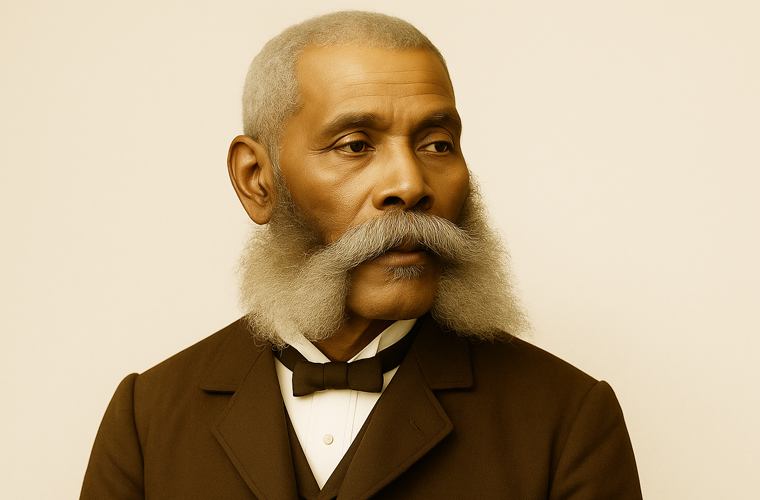Alexander Kelly, born on April 5, 1840, in Saltsburg, Conemaugh Township, Indiana County, Pennsylvania, stands as a towering figure in American military history. As a member of the 6th U.S. Colored Troops (USCT), Kelly earned the Medal of Honor—the United States’ highest military decoration—for his extraordinary bravery during the Battle of Chaffin’s Farm at New Market Heights, Virginia, on September 29, 1864. His life, marked by resilience, sacrifice, and quiet dignity, reflects the courage of a man who rose from humble beginnings to become a hero of the Civil War.
Kelly’s early years were shaped by adversity. Born into a small Black community in Saltsburg, where the Conemaugh River’s salt deposits supported local industry, Kelly was likely of mixed ancestry, described as “mulatto” with “light skin” in historical records. Orphaned by age 10, he and his siblings, including his older brother Joseph, were raised by their uncle, David Kelly, a salt boiler, and his probable wife, Nancy. The family lived among coal miners and salt workers, and by his early twenties, Kelly himself worked as a coal miner, a grueling trade that defined much of his early life.
In August 1863, at the age of 23, Kelly made a profound sacrifice: he volunteered as a substitute for his drafted brother Joseph, joining the 6th USCT at Camp William Penn, the first and largest federal training camp for Black soldiers during the Civil War, located in Chelton Hills, northwest of Philadelphia. Standing just over five feet tall, Kelly’s small stature belied his immense courage. The 6th USCT, commanded by Colonel John W. Ames, was the second regiment organized under President Lincoln’s Bureau of U.S. Colored Troops. Composed mostly of Pennsylvanians, the regiment paraded through Philadelphia in October 1863 before heading to battle.
Kelly’s service took him to Fortress Monroe and Yorktown, Virginia, where the 6th USCT faced grueling conditions. In June 1864, they captured a Confederate earthworks near Petersburg, a testament to their skill and determination. By August, the regiment was assigned to fortification duty at Dutch Gap on the James River, enduring polluted water and relentless enemy mortar fire. Many soldiers fell ill or died, but Kelly persevered, earning a promotion to first sergeant of Company F by September 1864.
The Battle of Chaffin’s Farm on September 29, 1864, was a defining moment for Kelly and the 6th USCT. On a misty morning, approximately 350 soldiers of the regiment, including Kelly, charged a fortified line of Texas Confederates under Colonel Frederick M. Bass. The assault was brutal, with heavy casualties, particularly among the color guard. When Lieutenant Frederick Meyer, wounded while carrying the regimental flag, struggled to advance, Kelly acted decisively. Under intense enemy fire, he seized the broken flagstaff from Captain Edgerton, who had also been shot, and carried the colors to safety, rallying his comrades in a moment of chaos and danger. This act of gallantry, alongside similar heroism by Sgt. Maj Thomas Hawkins earned Kelly the Medal of Honor, one of 14 Black soldiers recognized for bravery at Chaffin’s Farm.
Kelly’s citation, awarded on April 6, 1865, praised him for “gallantly [seizing] the colors” and rallying his men “at a time of confusion and a place of great danger.” The battle left its mark on Kelly, who bore permanent scars: a hole in his cheek, a lump on his forehead, and a scar on his back. He was mustered out in Wilmington, North Carolina, on September 20, 1865, with a modest pension of $8 per month, later increased to $12.
Returning to Pennsylvania, Kelly settled in Coultersville, where he married Victoria in 1866. The couple had a son, William, and adopted several homeless children, reflecting Kelly’s compassionate nature. He resumed work as a coal miner, as did his son, but by 1892, the family relocated to Pittsburgh’s East End. After Victoria died in 1898, Kelly worked as a stable watchman, while his son pursued a career as a music teacher. Kelly remained active in the Black community, joining the Colonel Robert G. Shaw Grand Army of the Republic (GAR) Post 206, a veterans’ organization named for the famed commander of the 54th Massachusetts.
Alexander Kelly passed away on June 19, 1907, at the age of 67. He was laid to rest beside Victoria in St. Peter’s Cemetery on Lemington Avenue in Pittsburgh. Initially unmarked, his grave now bears a Medal of Honor memorial, a fitting tribute to his remarkable service.
Kelly’s life embodies the courage and resilience of the U.S. Colored Troops, who fought not only for the Union but for their freedom and dignity. His actions at Chaffin’s Farm, preserving the regimental colors under fire, symbolize the unyielding spirit of Black soldiers in the face of systemic prejudice and battlefield peril. Kelly’s Medal of Honor, one of 16 awarded to Black soldiers during the Civil War, stands as a testament to his heroism and the sacrifices of the 6th USCT. His story, once obscured by time, now serves as an enduring inspiration, honored by the memorial at his gravesite and the historical record of his valor.

